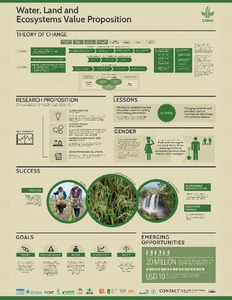Location
The International Water Management Institute (IWMI) is a non-profit, scientific research organization focusing on the sustainable use of water and land resources in developing countries. It is headquartered in Colombo, Sri Lanka, with regional offices across Asia and Africa. IWMI works in partnership with governments, civil society and the private sector to develop scalable agricultural water management solutions that have a real impact on poverty reduction, food security and ecosystem health. IWMI is a member of CGIAR, a global research partnership for a food-secure future.
IWMI’s Mission is to provide evidence-based solutions to sustainably manage water and land resources for food security, people’s livelihoods and the environment.
IWMI’s Vision, as reflected in the Strategy 2014-2018, is ‘a water-secure world’. IWMI targets water and land management challenges faced by poor communities in the developing countries, and through this contributes towards the achievement of the United Nations Millennium Development Goals (MDGs) of reducing poverty and hunger, and maintaining a sustainable environment. These are also the goals of CGIAR.
IWMI works through collaborative research with many partners in the North and South, and targets policymakers, development agencies, individual farmers and private sector organizations.
Resources
Displaying 281 - 285 of 959Opportunites d’investissement dans le forage manuel de puits en Ethiopie. In French
En ameliorant l’acces des agriculteurs et agricultrices aux eaux souterraines, il est possible de contribuer a un accroissement de leurs revenus, a une augmentation de leur securite alimentaire et a une amelioration de leur acces a l’eau pour leurs besoins domestiques et ceux de leur betail. Dans de nombreux contextes, le forage manuel de puits initie par le secteur prive est un moyen fiable et abordable d’acceder aux eaux souterraines peu profondes, mais il est peu repandu en Ethiopie.








